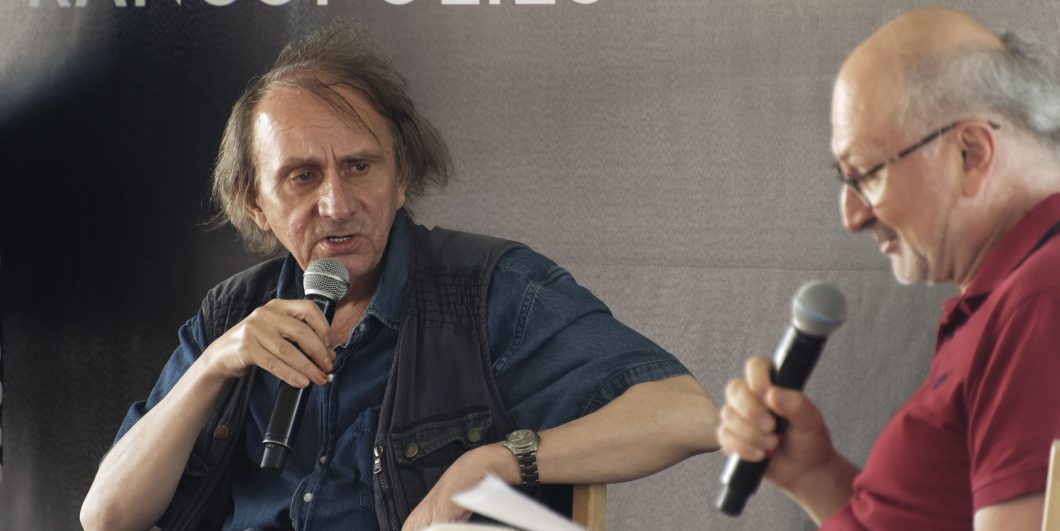Oren Cass's book succeeds masterfully as a work of politics regardless of what one thinks of its economics.
Victorian Pagans
Is France’s leading novelist, Michel Houellebecq, conservative? His 2015 novel Submission, about an Islamic party winning French national elections, resonated with conservative anxieties about Islamic immigration and the cultural transformation of the West. Houellebecq’s In the Presence of Schopenhauer, however, helps conservatives see he is a false friend.
This is a physically small 50-page book, but there is no reason good philosophy needs to be longer. Aquinas’s On Being and Essence, Descartes’s Meditations, and Leibniz’s Monadology are works for the ages shorter than a standard academic article today. Paragraphs by Schopenhauer make up the majority of the text—Houellebecq did the translations himself—and he follows up each with a brief commentary. His principle of selection: passages personally important to him. The book is not meant as an academic overview but think of it as a primer on how to think with Schopenhauer made by one of the most acute intelligences in France today.
Houellebecq is not shy about giving his opinion. The last great philosopher, he tells us, was Schopenhauer (1788-1860) and, in consequence, “it is ultimately annoying to live in the middle of a period of mediocrities—especially when one feels incapable of raising the level… I am pretty sure that I would produce better novels if the thinking around me were a little more inspiring.” There’s plenty of content like this, which is fun, and the passages from Schopenhauer are meaty and well-chosen for pondering. In the history of thought, Schopenhauer is the great pessimist, the chronicler of the suffering of existence.
Houellebecq’s Worldview
Like his fellow-German Leibniz, Schopenhauer was a panpsychist, arguing that everything in reality has both physical and mental attributes. He was also a monist contending that the universe is just one thing only, will and its manifestations. Will is the stuff of all that exists, even the most basic electrical and chemical forces, and will has an original fracture: at variance with itself, expressions of the will are mutually hostile. This explains the alienation and travail that mark all phenomena, and why suffering is the most prominent aspect of the world. The exceptional clarity and expressivity of Schopenhauer’s writing makes his worldview intelligible and enormously influential. A taste:
On this rests the perfect suitability of the human and animal body to the human and animal will in general, resembling, but far surpassing, the suitability of a purposely made instrument to the will of its maker… Therefore the parts of the body must correspond completely to the chief demands and desires by which the will manifests itself; they must be the visible expression of these desires. Teeth, gullet, and intestinal canal are objectified hunger; the genitals are objectified sexual impulse; grasping hands and nimble feet correspond to the more indirect strivings of the will which they represent.
In the Presence of Schopenhauer begins with a highlight reel of Houellebecq’s reading around the age of 26. He had spent a lot of time with the Bible, Pascal, Baudelaire, Dostoyevsky, and Thomas Mann, but Schopenhauer positively slammed into him. It was a defining, but not the definitive, intellectual encounter. He first read a book of aphorisms but quickly graduated to the masterwork (and hefty 700 page) World as Will and Representation (1818). On reading Schopenhauer’s magnum opus, Houellebecq went about Paris expressing astonishment to all that “the most important book in the world” was out of print. From his first reading of Schopenhauer, it would still be over a decade before he started to make his mark as a novelist.
In the meantime, the definitive intellectual influence upon Houellebecq’s thinking became clear in compatriot Auguste Comte. Founder of positivism, Comte (1798-1857) was Schopenhauer’s contemporary. Both were pagan, scientifically schooled, and completely committed to an immanent conception of existence hostile to religious transcendence. To this, Comte added a thorough-going materialism: psychology, he argued, is derivative of the physical sciences. It is easy to see why Schopenhauer’s idea of the world as brooding tragic will resonated with Gothic romanticism, but Comte stripped that world bare, reducing it to the history of flavourless and colourless atomization of chemical and electrical interactions, full stop. This is the creed of positivism. Ultimately, it is this vision which gets reality right, Houellebecq thinks.
When he threw himself into the World as Will and Representation he was struggling with Nietzsche, whom he found repulsive. For a time, Nietzsche (1844-1900) himself was under the sway of Schopenhauer, but he ultimately rejected him. Indeed, Nietzsche is often thought to have landed a fatal blow on Schopenhauer, characterizing him as a life-denier, an enormous metaphysical complainer. Nietzsche counters with the ideal of amor fati, taking whatever life throws at you on the chin and positively affirming that which is breaking you. To Houellebecq, this is a philosophical sop, and Schopenhauer is right to find the human condition contemptible. “We will leave this world as stupid and as wicked as we found it when we arrived.” This is Voltaire as quoted by Schopenhauer. Houellebecq adds that despite all the changes in our metaphysical and scientific conceptions “human life is still played out according to pretty much the same rules” and those rules are bleak: “the world of human passions is a repellent, often atrocious world.” Nietzsche erroneously papered over this reality with a rather traditional appeal to heroism and noble disdain for trauma.
Four Pillars of Conservatism
How does Houellebecq’s worldview stack up against prominent sources of conservatism? Eric Voegelin argues that political order stems an existential anxiety. Politics is an answer to an ultimately spiritual problem, the experience of a tension between chaos and a transcendent order not of our making. The more differentiated a cultural consciousness, the more potential for politics to be humanistic. Schopenhauer inverted this: the will is at war with itself thus its highest differentiation (the concepts, distinctions, and systems held in the human mind) is also its most lacerating. From Schopenhauer, Houellebecq takes the idea that existence is endless striving, with no end and no goal. Art offers a temporary respite. In a seminal analysis of aesthetics, Schopenhauer criticizes Dutch still life for being anything but: food is presented as positively appetizing, thus stimulating the will and provoking suffering. Other art, like botanical drawings, stills the will, and this art is truly beautiful. Schopenhauer:
Fruit is still admissible, if it is presented as a development of the flower and as a product of nature, beautiful in form and colour, without our being directly obliged to think of its edible properties; unfortunately, we often find, painted with artless realism, dishes prepared and ready to eat such as oysters, herring, lobsters, slices of bread and better, beer, wine, etc., which is altogether reprehensible.
Ultimately, there is no reprieve for the human spirit. A biblical vanity dethrones even art. Houellebecq: “Many of his best passages, in fact, are more reminiscent of a commentary on Ecclesiastes 1:8: ‘All things are full of labour; man cannot utter it.’ It is not only, or even especially, human activity that is a form of vanity: nature, the whole of nature, is an endless striving, without purpose or respite: ‘All is vanity and vexation of spirit’ (Ecclesiastes 1:14).” This does not make life absurd, it just is what it is: dull, immanent forces grinding away. Positivism also had a meliorist aspect, that through science history would improve. Comte rids Schopenhauer’s world of romanticism, and Schopenhauer rids Comte’s of hope. Human life is just vitalism, yet even here the will does not set out to edify. Serotonin is Houellebecq’s most recent novel and grimly plays with the social- and psycho-pathology of the under-vitalized (the main character, Labrouste) and the over-vitalized (Labrouste’s girlfriend, Yuzu).
Leo Strauss fares no better. Our attraction to someone’s lovely figure or our recoil from a threat has the same origin, insists Houellebecq: “how can we not recognize, mediated by reason, and rendered accessible and expressible by language, the elementary powers of natural forces, acting eternally and invariably?” Matter operating unrelentingly topped with mental insight, this dualism has no room for the idea of an ordered human nature, combining social inclinations and rational management of appetites. Strauss reclaimed the idea of human nature that had prevailed from the Greeks, through the Middle Ages, up as late as Leibniz and Adam Smith. In his remarks on the death of Churchill, Strauss asked that political science contemplate the heights to which human greatness can still climb. He also asserted that Churchill’s Marlborough, a biography of his aristocratic warrior ancestor, was the best work of history in the 20th century and ought to be basic reading for political science students. In Houellebecq’s world, aristocracy has deteriorated, his character Aymeric in Serotonin is a failing farmer, a drunk, and contemplating suicide. Liberalism, of course, leaves few other possibilities for the aristocrat, but the book ends with Labrouste, a state bureaucrat, thinking of exiting it all, too. The will is indifferent to ideology. Strauss, like Nietzsche, is far too complimentary to nature.
A third pillar of conservatism today is libertarianism. Metaphysically, some libertarians are materialists, but they also hold to natural rights. Personal rights are a framework for commerce. In his 1998 novel The Elementary Particles (also known as Atomised), Houellebecq portrays a world where science, having finally gained total clarity that humans are just particles that decay, learns how to suspend human reproduction and clone neo-humans (also a theme of his 2005 The Possibility of an Island). Particles offer no anchor for rights (in Natural Law and Human Rights, fellow French contemporary Pierre Manent dwells on this problem, too). Ethically unmoored, business contracts are just use of others. A number of Houellebecq’s novels feature sex tourism. Commerce is consumption, in the sense of Schopenhauer’s gullet. Houellebecq’s sex tourists are depressed, alienated, middle-aged Westerners visiting poor countries where the dollar goes far, but the bleakness of his depictions should not be confused with regret or criticism. The body is objectified will and serotonin needs to be pumped somehow.
Another source of conservatism today is classical liberalism, but Adam Smith’s elegant symmetries are not for Houellebecq. To Schopenhauer’s eye, the world is majestic in its desolation and horror. Citing a traveler to Java, Schopenhauer relays a beach as far as the eye can see covered with bones: turtles come ashore to lay eggs, dogs feast on them, and as they feast tigers from the forests come to eat the dogs. “This desolation is renewed thousands and thousands of times, year after year; it is for this purpose that these turtles are born. For what fault must they endure such a torment? Why these scenes of horror? There is only one answer: in this way the will to live objectifies itself.” A passage that likely shapes Houellebecq’s rendering of Western sex tourists in sunny climes.
Adam Smith’s replacement as professor of ethics at Glasgow was fellow Scot Thomas Reid, who figures prominently in Schopenhauer’s epistemology. Smith completed the sixth edition of The Theory of Moral Sentiments just thirty years prior to The World as Will and Representation and in it he throws out an important challenge to any pessimist. Houellebecq is quick to admit that Schopenhauer, who was a man of independent means, lived a thoroughly self-satisfied life as a well-heeled Victorian bourgeois. This hints at an important data point to a Smithian argument. Smith identifies an ethics of extreme sympathy that trades on a factual mistake. Smith:
But first of all, this extreme sympathy with misfortunes which we know nothing about, seems altogether absurd and unreasonable. Take the whole earth at an average, for one man who suffers pain or misery, you will find twenty in prosperity and joy, or at least in tolerable circumstances. No reason, surely, can be assigned why we should rather weep with the one than rejoice with the twenty. This artificial commiseration…
It is perhaps a curious thing to suggest that a man (Schopenhauer) who kicked his cleaning lady down the stairs and begrudged ever after paying her disability (he celebrated wildly when the poor woman passed) is a confused sentimentalist. Offended, Schopenhauer recoils from the measly character of existence, but Smith counters that this moral attitude trades on bad empiricism. It just is not factual that suffering is the prominent feature of human existence. Positivism demands scientific investigation and Smith thinks a healthy dose of social science will show that, on average, humans are rather happy and doing tolerably enough. The sociological landscape in Houellebecq’s novels is bleak, but Smith, always calm and analytic, would think it altogether overwrought.
Houellebecq is no conservative but conservatives ought to study him. Following the Victorian pagans, he thinks the West’s scientific discoveries utterly at odds with Western humanism. This formulation of the crisis of the West puts the division of labour in the dock. Responsible for the refinement of the arts and sciences, the division of labour, Smith contends, will make us gentler and freer. Recently, John Gray has argued that the division of labour has gutted our communities and invited surveillance capitalism to deliver the security that once was provided by our vanished neighbours. Schopenhauer’s critical claim is that the refinement of human consciousness is not progress, it is the intensification of suffering.
For Houellebecq, we are in the presence of Schopenhauer because the division of labour (the will at variance with itself) is unrelenting and even pushing us to the cusp of an algorithmic remaking. Cheekily, he hints that digital neo-humans might be a way out of the crisis but only because there will then be fewer humans. Before he made the word sociology fashionable, Comte had thought to call the new discipline social physics. Houellebecq is at peace with the idea that human relations reduce to physics, the long history of Western meditation on human dignity is not. Since Burke, conservatism has staked its claim as the guardian of this long tradition of humanism and the challenge Houellebecq poses is for conservatives to freshly show that commercial civilization is not a case of Schopenhauer’s gullet but genuine refinement and liberty.



